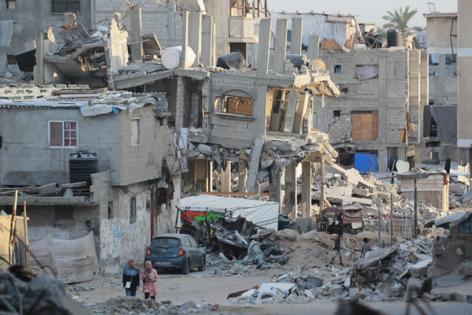Israel says Hamas chief may have been killed in Gaza attacks
Published in News & Features
Israel said an operation in Gaza may have killed Hamas leader Yahya Sinwar, part of a renewed assault against the militant group after more than a year of war in the Palestinian territory.
The Israel Defense Forces said Thursday it’s “checking the possibility” that Sinwar was one of three people killed at a location it didn’t specify. The Hamas leader, who hasn’t been heard from in weeks, is the Iran-backed group’s most senior member following the assassination of Ismail Haniyeh in Tehran in July.
Tests have indicated it was Sinwar who was killed, Israel’s N12 news channel reported.
The IDF has stepped up attacks on the northern part of Gaza in recent days, sending troops back into the area and increasing airstrikes, in an effort to stop Hamas regrouping. A strike earlier Thursday on a school in northern Gaza — which the IDF said was an “operational meeting point” for Hamas and Islamic Jihad militants — killed at least 15 people.
Hamas, which is backed by Iran and considered a terrorist organization by the U.S., triggered the war with its raid of Israel on Oct. 7 last year, killing about 1,200 people. More than 42,000 Palestinians have been killed in Gaza in the ensuing military campaign, according to health officials in the Hamas-run territory, and the conflict has since spilled over into Lebanon.
There were no signs of hostages in the building targeted in the strike that may have killed Sinwar, the IDF said. Hamas kidnapped about 250 people on Oct. 7, of which fewer than 100 are believed to be alive and still in captivity, and it had been reported in Israel that Sinwar was with them.
If confirmed, Sinwar’s death would be the latest in a string of recent killings by Israel of senior members of Iran’s allied militia groups. As well as Haniyeh, the military assassinated Hassan Nasrallah, the long-standing leader of Lebanon-based Hezbollah, in an airstrike in Beirut last month.
Israel has escalated its offensive against Hezbollah in recent weeks, launching air assaults on Beirut and other areas and staging a ground invasion of southern Lebanon. Hezbollah, which is also considered a terrorist organization by the U.S., has been firing missiles back across the border into Israel.
Yemen Bombing
Earlier Thursday, U.S. B-2 stealth bombers struck weapons depots linked to the Houthis, another Iran-backed group, who have attacked commercial shipping in the Red Sea since late last year.
The strikes hit bunkers containing missiles and other munitions “used to target military and civilian vessels throughout the region,” U.S. Central Command said. There’s no indication of civilian casualties, it added.
The Houthis said U.S. and UK strikes hit the capital Sanaa and the Saada governorate. The group was designated a terrorist organization by the U.S. earlier this year.
The U.S. and allies have repeatedly struck the Houthis but have so far been unable to halt their attacks. On Thursday Israel said it intercepted another drone that approached its territory from the Red Sea overnight.
Message to Enemies
The use of B-2 bombers was intended to send a message, according to Defense Secretary Lloyd Austin.
“This was a unique demonstration of the United States’ ability to target facilities that our adversaries seek to keep out of reach, no matter how deeply buried underground, hardened, or fortified,” he said.
The message may have been intended for Iran, which has moved much of its nuclear program below ground in recent years. The B-2 is the only U.S. aircraft equipped to use the Massive Ordnance Penetrator, a bomb that the airforce says is specifically designed to destroy “adversaries’ weapons of mass destruction located in well protected facilities.”
The comments came as Israel weighs a response to Tehran for the firing of 200 ballistic missiles at the country more than two weeks ago. The U.S. has been urging Prime Minister Benjamin Netanyahu’s government to avoid striking oil or nuclear targets.
Iran’s Foreign Minister, Abbas Araghchi, met Egyptian President Abdel Fattah El-Sisi in Cairo as he continued an intense round of shuttle diplomacy aimed at stopping Israel’s military operations in Gaza and Lebanon.
Araghchi has already visited Saudi Arabia, Qatar, Oman and Jordan. His stop in Cairo marks the first time an Iranian foreign minister has visited Egypt in more than a decade, underscoring the extent to which its current standoff with Israel has drawn Tehran closer to its Arab neighbors.
—With assistance from Fadwa Hodali, Fares Akram and Golnar Motevalli.
©2024 Bloomberg L.P. Visit bloomberg.com. Distributed by Tribune Content Agency, LLC.







Comments